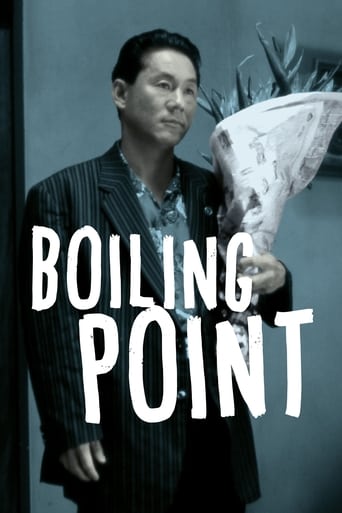

I have recently been going through Kitano's films, and upon seeing thing, I think it's probably the one I like the least. It's kind of a weak film. It has it's moments, but as a whole is too slow and bizarre for it's own good.Just like most Kitano films, it has his signature style. The sudden violence, the comedy, all those things, but in this film it just doesn't work. I think a big gripe is that the story feels too loose. You kind of get lost as to why certain things are happening or how certain characters know each other. It actually begins to feel like two separate films about 50 minutes in. Personally, I found myself more engaged in the story that occurs 50 minutes in then the rest of it. One of the big issues seems to be that Kitano doesn't show up until that later point, and it just feels like not enough of Kitano's character. Also, the ending doesn't help clarify the film. In fact, it makes it more confusing. I won't give it away, but it can be interpreted in different ways. But I will say that if you interpret it one specific way, it kind of explains the general odd-ness of the film.Kitano is known for including some strange things in his movies, but this one just kinda takes it over the top. While the movie can be quite funny, such as a scene involving an M16 hidden in a bouquet of flowers accidentally going off and causing a funny reaction, it just feels like it delves too deep into the comedy and it makes any drama feel odd. There's also some confusing things, like Kitano's character raping his male friend, and then him not really caring the next day. Or Kitano raping a random woman. Some very odd things to include without any reason. There is also a scene where it appears like we are supposed to see the same event twice, but it is all done in one take, which makes it quite confusing, but kind of impressive at the same time. Really strange to see. Although I will give the film credit for somehow making girlfriend abuse funny. (It sounds odd but when you see him hitting her, you can't help but laugh)Overall I think this is a weak Kitano film. It doesn't give me enough drama or character development to keep my interest. I think that's it's biggest problem. It's slow but not for the right reasons, such as building characters and relationships before the big climax, but just feels slow so it can include silly and odd scenes. Only recommended for Kitano fans.
... View Morethis is my 3rd Kitano movie (after Violent Cop & Brother), i enjoyed this as much as the other, Kitano's movies move at such a pace which you think would be boring but there's something about his movies which draws you in.This film was pretty much hilarious and brutal at the same time, i mean you wouldn't usually laugh at woman getting used for sex and getting slapped about harshly at every turn, but the way Takeshi's character does it makes it hilarious, especially the scene involing the ice lollies outside the store...bizarre humour.This movie had a strange story, it never goes into enough depth to make you get real sucked into the characters, so the final scene, whilst spectacular kind of leaves you thinking 'they all died?'.Other than a pretty shallow story i found this very entertaining...Takeshi's movies rule! Check this.
... View MoreHaving heard good things about Takeshi Kitano's films, I was looking forward seeing "Boiling Point", having purchased both this and "Sonatine" in the sales, even though it broke my Golden Rule of impulse buys: don't buy any film with quotes from un-named sources on the sleeve (especially if they've got spelling mistakes), in this case "A Genuine Original", "Beautifully directed, Indispensible viewing".Anyway, the quotes were more misleading than lying, as the film definitely is both original and beautifully directed, but only really indispensable for fans of Kitano's, who don't need me to tell them to watch it. For everyone else, it probably isn't the best Kitano film to start with. Marketed as an action movie, the film is much more and much less: it has more heart and intelligence, but much less in the way of action or excitement, feeling more like a slow-burning drama with a little bit of gun-play and one big explosion; John Woo this ain't. However, the acting, from Kitano in particular, is excellent as is the stylish direction: Kitano fills the screen with beautiful images and twisted humour.Worth a look, if you keep in mind that's very slow moving tale, with more baseball action than there is action movie. *** out of five.
... View MoreI saw "Hana-bi" and thought it was good so I rented this with a friend.It was going to be a comedy but after about 20-30 minutes we was wondering what we was watching.A weird film that is almost impossible to understand and IT´S NOT A COMEDY. When the film had end I thought it was awful and bad but a couple of weeks later I started to think about it and I now I like the acting and some scenes but see "Hana-bi" instead.2/5
... View More